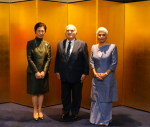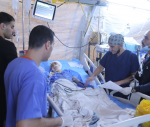You are here
Gaza's orphans and the crisis of human conscience
Oct 28,2024 - Last updated at Oct 28,2024
The human conscience is conflicted by what is unfolding before the world’s eyes: The killing and displacement of Gaza’s children, which shakes the very core of our human dignity and forces us to reevaluate our moral and religious principles. This crisis also undermines trust in international institutions. What we witness, the disregard for international law, the imposition of might over right, and the encroachment on humanitarian organisations, leaves these organisations nearly powerless to confront what has become the greatest tragedy for children in our contemporary history. As UNRWA Commissioner-General Philippe Lazzarini described it, “The number of children killed in Gaza in just four months exceeds the number of children killed in four years of wars around the world.”
At a time when international organisations and human rights associations are working to activate international agreements and charters related to children and their rights, and to encourage the enactment of laws that guarantee them a dignified life and safe living, we find negativity and inadequacy in the face of what the children of Gaza face every day: Killing and injustice, pain and oppression, hunger and deprivation. We are also astonished by this disregard and inability to respond to the cries and suffering of the children of Gaza, who are burdened by the horrors of war, the sorrows of loss and orphanhood, and the pains of illness, hunger and fear.
If religious and humanitarian values compel us to defend children wherever they are and to protect them from killing, extermination and displacement; they also require us to show them mercy and care, especially when they lose their family support from their fathers, mothers, or caregivers. This should be done by ensuring them a dignified life and providing the necessary health, educational, and social care that preserves their dignity, maintains their humanity, and empowers them within society. Allah, the Almighty, addressed His noble Prophet, peace be upon him, saying: (Herefore, be not harsh with the orphan;). It is indeed an oppression of the orphans of Gaza that the world of believers abandons its responsibility toward them, leaving them to face their fate alone.
Merely sympathy alone is not enough to alleviate the suffering of orphans and fulfill the religious and humanitarian duty toward them. Moreover, their care and support are not limited to providing food and drink alone. The value of 'doing good to the orphan' encompasses broad implications regarding both actions and words, at the individual, community, state, and national levels, as well as within the Islamic and human world. Doing good to the orphan necessitates empowering them socially, educationally, health-wise, and psychologically, and establishing effective institutions that take on this significant role, while achieving solidarity and cooperation in both Islamic and humanitarian contexts to undertake this great mission.
In June, UN Secretary-General Antonio Guterres informed the Israeli mission to the United Nations that he had decided to include Israel on the “blacklist,” or what is known as the “shame list” of countries and organisations that harm children in conflict areas. However, this “shame” did not halt the ongoing killing of children in Gaza, nor did it prevent major countries from continuing their unlimited support for the occupying forces with the latest types of destructive tools and internationally banned military weapons.
In a report issued by the UN Committee on the Rights of the Child regarding the situation of children in the occupied Palestinian territories on September 16, 2024, it stated: “The enormous number of children in Gaza who are still being killed, mutilated, injured, missing, displaced, orphaned and exposed to famine, malnutrition and disease, along with the repeated displacement of Gaza's residents due to the indiscriminate and disproportionate attacks carried out by Israel on Gaza using explosive weapons with wide-area effects in densely populated areas, and the deprivation of access to humanitarian aid, has led to the displacement of at least one million children. Additionally, 21,000 others have gone missing, while 20,000 children have lost one or both parents, along with 17,000 who are unaccompanied or separated from their families.”
Working to protect orphans is a humanitarian and moral necessity imposed upon us by the teachings of religions. It is not a coincidence or a trivial matter that the Seal of the Prophets, Muhammad, peace be upon him, experienced the pain of orphanhood before Allah, the Almighty, chose him as the last of the messengers and made him a mercy for the worlds. No one understands the value of mercy and the need for it better than one who lost his father while still in his mother's womb, and then lost his mother at the age of six. Therefore, Allah reminded him of the blessings He bestowed upon him, saying: ”[Did He not find you an orphan and then gave you shelter? Did He not find you unaware of the Right Way, and then directed you to it? And did He not find you in want, and then enriched you? herefore, be not harsh with the orphan; and chide not him who asks, and proclaim the bounty of your Lord.] Quran [93: 6-11]."
The Torah calls for the protection of orphans and warns against harming them to avoid the wrath of the Creator, as reflected in Exodus 22:22-23: "Do not mistreat any widow or orphan. If you do mistreat them and they cry out to Me, I will surely hear their cry." And in the Psalms of David [Psalm 82:3], regarding justice for the orphan: "Defend the weak and the fatherless; uphold the cause of the poor and oppressed." So where do the aggressive practices of Zionism stand in relation to the teachings of the holy scriptures?
The world's abandonment of its responsibility toward the children of Gaza, its inability to respond to their cries for help and tears, and its failure to extend a hand to rescue them, signifies the death of the values of mercy and compassion in the human conscience, transforming the land of Gaza into a graveyard for humanitarian values and meanings, buried alongside its martyrs and children, who complain to Allah about the harshness of contemporary Islamic sentiment and the weakness of human conscience. Therefore, the sponsorship of orphans in Palestine must be a priority in the response plans of Arab, Islamic and global relief organisations. A successful response to this issue includes a comprehensive approach to the problems of blockade, the lack of life security, both psychological and nutritional, as well as poverty, deprivation and unemployment.
While we appreciate the efforts made by the Hashemite Charity Organisation and various Arab and international relief agencies in the Gaza Strip, we still need much more work to meet the needs on the ground. Additionally, delivering aid requires the existence of international political will that ensures the arrival of assistance and prevents extremist Zionist groups from controlling the entry of humanitarian aid to besieged families.
Protecting refugees and ensuring their safety is not limited to providing an opportunity to escape death within their homeland; it also includes protecting them from epidemics, diseases, exploitation, and monitoring their mental and psychological health. Here, I must emphasise that we are faced with multiple indices of deprivation and oppression that converge today in one place called the Gaza Strip. Therefore, the orphans of Gaza are not like other orphans in the world; their small eyes have witnessed horrors that even the strongest and most resilient men cannot bear, including the killing of their parents and the destruction of their homes. They are children who have survived the crimes of genocide and ethnic cleansing perpetrated by the occupation.
History teaches us that the arrogance of conquerors always drives them to further killing and extermination, sparing neither small children nor the elderly. It also teaches us that the search by tyrants and extremists for the illusion of “complete victory” makes them unaware that the oppression and terrorism perpetrated by their hands will only increase the resilience and determination of peoples yearning for freedom to achieve a better life for future generations.
El Hassan bin Talal — President of the Arab Thought Forum














Add new comment